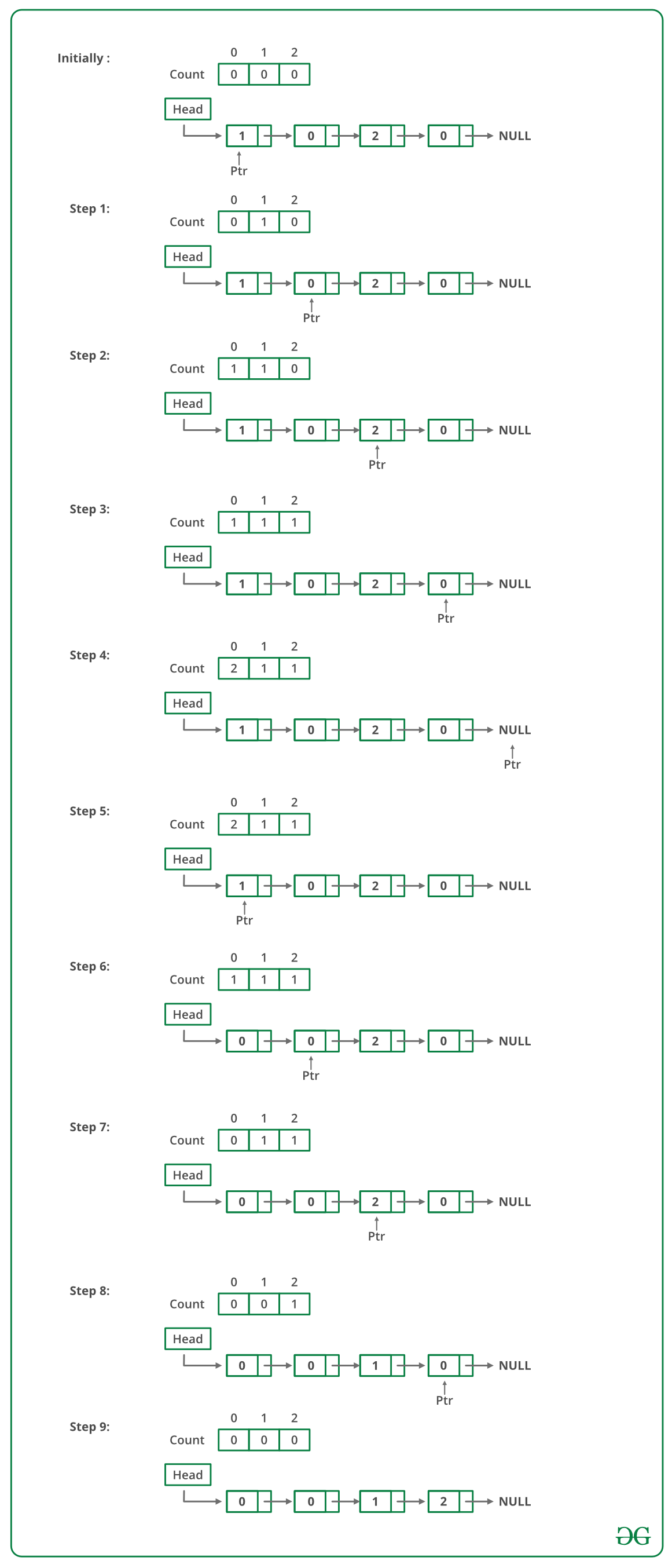C Program For Sorting A Linked List Of 0s, 1s And 2s
Last Updated :
07 Nov, 2022
Given a linked list of 0s, 1s and 2s, sort it.
Examples:
Input: 1 -> 1 -> 2 -> 0 -> 2 -> 0 -> 1 -> NULL
Output: 0 -> 0 -> 1 -> 1 -> 1 -> 2 -> 2 -> NULL
Input: 1 -> 1 -> 2 -> 1 -> 0 -> NULL
Output: 0 -> 1 -> 1 -> 1 -> 2 -> NULL
Source: Microsoft Interview | Set 1
Following steps can be used to sort the given linked list.
- Traverse the list and count the number of 0s, 1s, and 2s. Let the counts be n1, n2, and n3 respectively.
- Traverse the list again, fill the first n1 nodes with 0, then n2 nodes with 1, and finally n3 nodes with 2.
Below image is a dry run of the above approach:

Below is the implementation of the above approach:
C
#include<stdio.h>
#include<stdlib.h>
struct Node
{
int data;
struct Node* next;
};
void sortList(struct Node *head)
{
int count[3] = {0, 0, 0};
struct Node *ptr = head;
while (ptr != NULL)
{
count[ptr->data] += 1;
ptr = ptr->next;
}
int i = 0;
ptr = head;
while (ptr != NULL)
{
if (count[i] == 0)
++i;
else
{
ptr->data = i;
--count[i];
ptr = ptr->next;
}
}
}
void push (struct Node** head_ref,
int new_data)
{
struct Node* new_node =
(struct Node*) malloc(sizeof(struct Node));
new_node->data = new_data;
new_node->next = (*head_ref);
(*head_ref) = new_node;
}
void printList(struct Node *node)
{
while (node != NULL)
{
printf("%d ", node->data);
node = node->next;
}
printf("n");
}
int main(void)
{
struct Node *head = NULL;
push(&head, 0);
push(&head, 1);
push(&head, 0);
push(&head, 2);
push(&head, 1);
push(&head, 1);
push(&head, 2);
push(&head, 1);
push(&head, 2);
printf(
"Linked List Before Sorting");
printList(head);
sortList(head);
printf(
"Linked List After Sorting");
printList(head);
return 0;
}
|
Output:
Linked List Before Sorting
2 1 2 1 1 2 0 1 0
Linked List After Sorting
0 0 1 1 1 1 2 2 2
Time Complexity: O(n) where n is the number of nodes in the linked list.
Auxiliary Space: O(1)
Please refer complete article on Sort a linked list of 0s, 1s and 2s for more details!
Like Article
Suggest improvement
Share your thoughts in the comments
Please Login to comment...